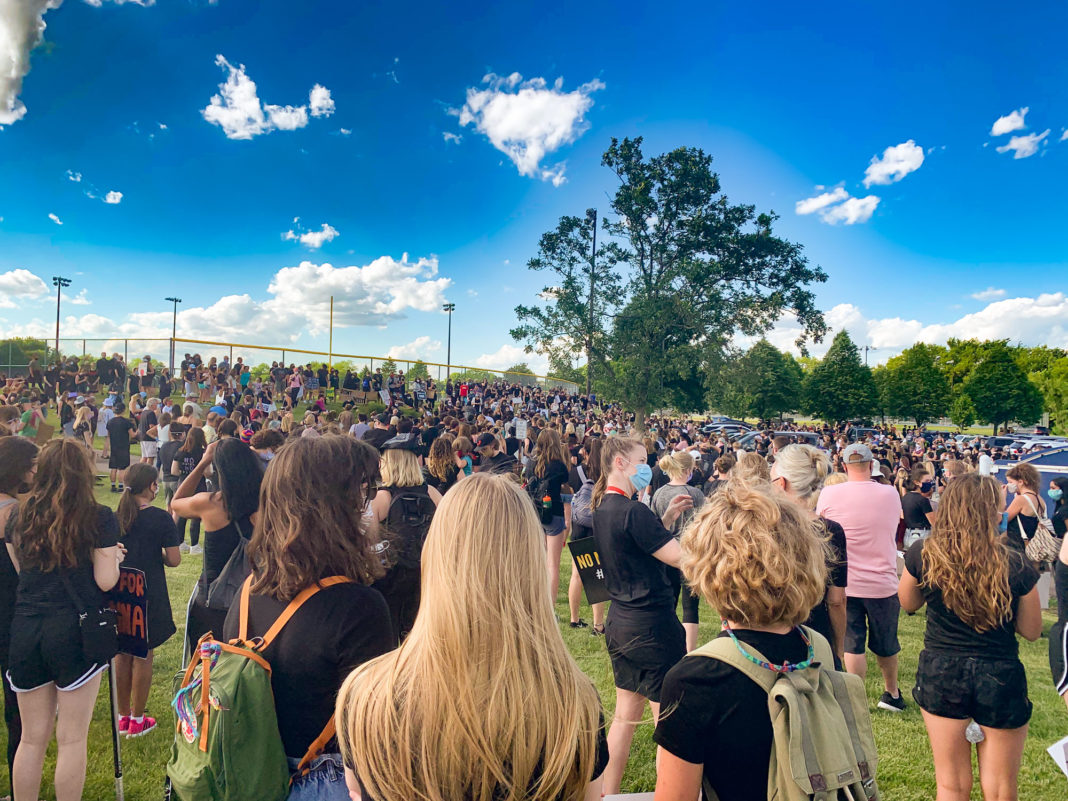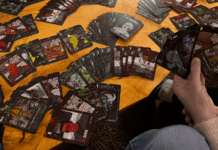After the brutal murder of Minneapolis resident, George Floyd, the nation’s tears poured out across the country as people cried out for change. Nunu, a 2020 Wayzata High School graduate, was stunned and outraged after returning to her suburban home from visiting the George Floyd Memorial in Minneapolis: Why is there no outcry, no response, here in the suburbs? Nunu expressed her disappointment on social media, and she did get a response. A fellow suburbanite was also upset and the two decided to do something about it.
SUBURBAN ACTIVISTS IS BORN
These young women formed a group called Suburban Activists consisting of seven Wayzata Public Schools students and alumni. Their organization aims to stand up for injustices of Black, Indigenous, and People of Color (BIPOC) and impact change for these marginalized populations.
The Suburban Activists’ first event was a Justice for George Floyd March in June. The march began at Parkers Lake in Plymouth, progressed east on Highway 55 and ended at Plymouth City Hall with close to 1,000 community members marching together to protest Floyd’s killing. At the conclusion of the walk, a variety of speakers talked about racism as a sea of suburban folks held up Black Lives Matter signs. The organizers were encouraged at the large show of supporters and decided to get cracking on their next event.
July’s event took place at the Minnetonka Community Center as the Awaken the Suburbs Rally for Equity and Education. The Suburban Activists coordinated local speakers and food vendors, with community members donating to support the cause. Attendees heard from Zina Alston Fizer, a candidate running to be the first Black woman in office for Senate District 44. In addition, BIPOC student speakers told personal narratives about their inequitable experiences in school.
This past August I caught up with Suburban Activists Camille, Nunu, and Savanna. The group’s next mission is to work together with Wayzata Public Schools to share their experiences and make improvements within the school district.
WORKING WITH WAYZATA SCHOOLS – THE DATA
The Suburban Activist’s first grievance is that a disproportionate number of Black students are placed in The Alternative Program (TAP), special education and lower-level classes. To confirm this disproportionality, a data specialist at the Minnesota Department of Education aggregated special education data by race/ethnicity. The Wayzata High School data shows that 16% of Black students (not including Black biracial students) are in special education compared to 6% of white students. This unsettling difference is not just unique to the high school: when combining data from all three middle schools, 18% of Black students are in special education compared to 8% of white students. Even our youngest students cannot escape inequitable education–data shows the elementary percentages mirror the middle and secondary percentages. Additionally, multiple members of the group shared that when they requested placement in more challenging classes, they were discouraged and told the courses were too difficult for them. Camille, a 2019 Wayzata High School graduate, shared she was the only Black student in her advanced placement courses. Not only are Black students more likely to end up in remedial courses and be referred to special education, but they are also less likely to be in advanced courses.
ADVANCING BIPOC CURRICULUM
Changing curriculum to include BIPOC people and their stories is another goal Suburban Activists would like Wayzata to consider. For instance, in one of Nunu’s courses, assignments were void of BIPOC representation. When the teacher for this class let the students select a subject to analyze and report on, Nunu requested one with two Black protagonists, but the teacher turned down her selection. When Nunu asked for a reason why her choice was not approved, the instructor became upset, declined Nunu’s subject selection and never provided a reason why Nunu’s request was prohibited.
For Savanna, a senior at Wayzata High School, the white-centric curriculum at Wayzata has had a negative impact on her. For Black History Month, students were assigned a book written by a white author, in a white framework, centering on white people. Savanna refused to read it. Since that experience, Savanna observed the continued assignments of white-centric texts and histories; consequently she paid less attention in school because she knew inaccuracies existed while BIPOC voices were not represented.
ACCOUNTABILITY: CREATING A RACIST-FREE ENVIRONMENT
Another issue the Suburban Activists want addressed by schools is the lack of accountability for racist actions. As a seventh grader exploring her identity and trying to fit in, Nunu sought acceptance by her peers. One of the many ways she did this was to straighten her hair to look like everybody else; however, one day she decided to let her natural hair show. She remembers wanting to be proud of her natural hair but also feeling self-conscious and anxiously hiding in the bathroom before school started. When Nunu finally headed to class, all her classmates stared at her. Class proceeded, but her peers just could not stop staring. As a result, Nunu said, “My teacher asked me to pull my hair back because it was a distraction to the class.” Telling a Black girl at any age, but especially during these crucial years of identity searching, that her natural hair is a distraction caused Nunu to question her self worth. “Being me, a Black girl, is not okay.”
Similarly, Savanna had racialized experiences where accountability was lacking. While in middle school, one of Savanna’s teachers approached her in the cafeteria lunch line and asked her if she knew who her dad was or if he was even around. Savanna reported this microaggression to her mom who reported the incident to the principal. Afterwards the teacher didn’t apologize to Savanna, but ignored her and would not call on her in class for the remainder of the year. From then on, Savanna shared, “I never asked this teacher for help again because it was awkward and it felt weird.”
Savanna endured several incidents when white peers used the n-word in her presence and in front of teachers. The n-word even showed up on the middle school website in a bright yellow bolded font: Whips for N (captured in a screen shot). In a class incident, Savanna spoke up, ¨Excuse me. What did you just say? That word is offensive and should not be used.” The student went uncorrected by the instructor and packs of white students defended the use of the word by saying, “It’s not that big of a deal!¨
Suburban Activists hope to work with their school district to create a safe, well-communicated process for students to report racialized incidents where teachers and students take responsibility for their actions and work to repair harm.
ENHANCEMENTS TO END RACISM IN SCHOOLS
The other issues the group would like addressed are the following: the lack of BIPOC teachers; the balance of power between Black Achievement Specialists who work with Black students and school counselors; the absence of mental health resources specific to issues the Black community faces; inaccessibility to SAT/college prep materials; presence of armed police liaisons on campus and the school-to-prison pipeline that criminalizes Black students. These issues are not unique to Wayzata Public Schools, and Suburban Activists are hopeful they can work together with their school district to make education equitable and anti-racist for all students.
WAYZATA SCHOOL DISTRICT STATES COMMITMENT FOR EQUITY AND ACCESS TO ALL STAFF & STUDENTS
District leaders have welcomed the opportunity to meet with the group, and had this to say:
“Stories like these highlight that we have more work to do to address systemic racism in our schools, as well as in our communities and in society as a whole. We have been and will remain committed to creating a school community and culture where microaggressions like these no longer occur and where students, families and staff of color feel safe and valued as the norm in our school community. We as a school district have renewed our commitment to addressing systemic racism through staff and student learning, reflection and increased action. Thus far this has included district-wide professional development, differentiated learning options for staff, affinity space for staff of color, and a leadership retreat for high school students to help plan next steps. Our commitment to ensuring equity and access for each and every student will continue to be expanded during the upcoming school year. We will continue to seek and identify inequities in our systems, policies and practices and make needed changes that align our practices with our values. Wayzata Public Schools is committed to doing better.”
As Camille begins her sophomore year at college, Nunu her freshman year at college, and Savanna her senior year at Wayzata High School, these three pioneers will continue to work with the other Suburban Activists to push for an anti-racist, equitable education for all students. During a pandemic, most families lament that they are just trying to survive the best they can. Black and indigenous children have had to survive school since the beginning of American schools. These three impressive young women are not just surviving school; they are striving towards a better education for themselves, BIPOC students, and future generations.







